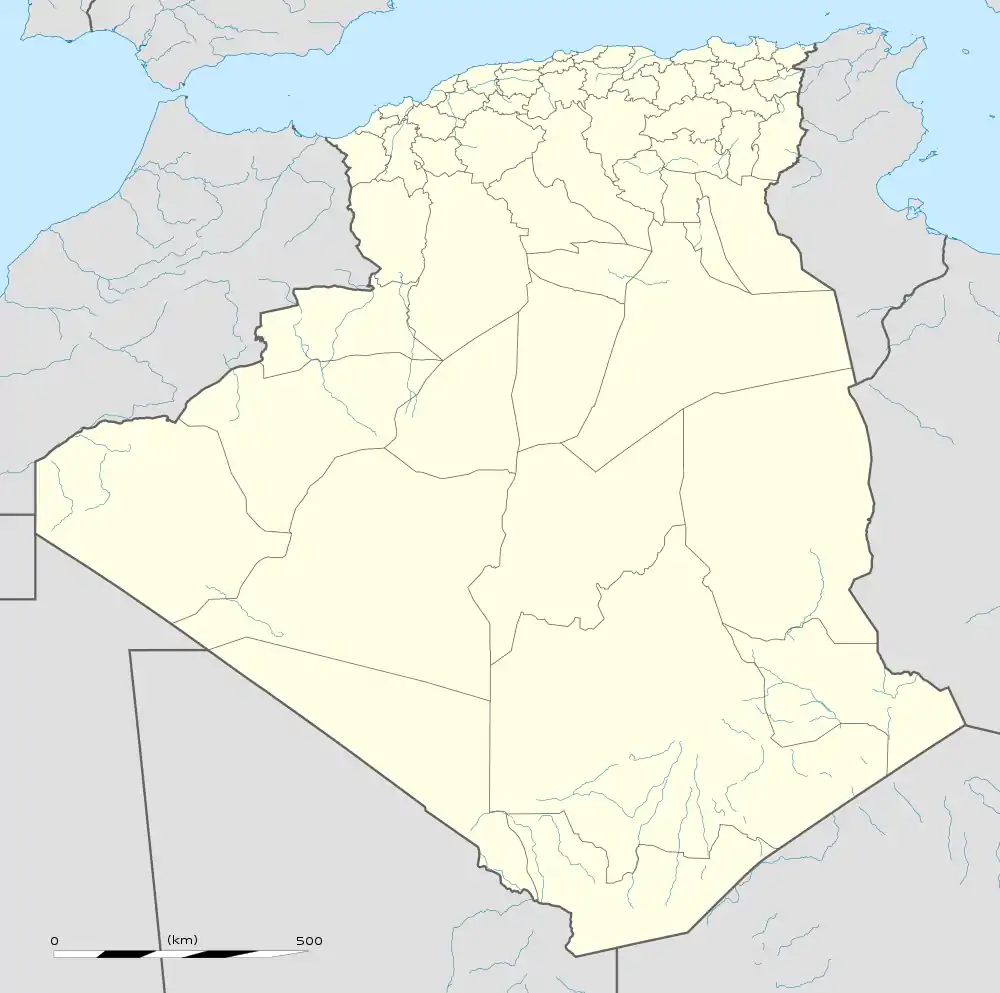Reggane series, French nuclear tests
The Reggane series was a group of 4 atmospheric A-bomb nuclear tests conducted by France between February 1960 and April 1961, close to the end of the Algerian War.[1] The bombs were detonated at the Saharan Military Experiments Centre near Reggane, French Algeria in the Sahara desert region of Tanezrouft, by the Nuclear Experiments Operational Group (GOEN), a unit of the Joint Special Weapons Command.[2] The series saw the explosion of the first French nuclear weapon and was followed by the In Ekker series.
| Reggane series | |
|---|---|
 Location of the Saharan Military Experiments Centre (CSEM) | |
| Information | |
| Country | |
| Test site | Reggane, French Algeria |
| Coordinates | 26°18′42″N 00°03′26″W |
| Period | 1960–1961 |
| Number of tests | 4 |
| Test type | Atmospheric |
| Device type | A-bombs |
| Max. yield | 70 kt (292.88 TJ) |
| Test series chronology | |
Codenames
All four operations were named after the jerboa (Gerboise), a desert rodent found in the Sahara, with the adjunction of a colour. The first three colours adjuncted (blue, white and red) are said to come from the French Flag.[3]
Chart of the tests
| Codename | Date time (UTC) | Location | Elevation | Altitude | Delivery | Purpose | Device | Yield | Fallouts[lower-alpha 1] |
|---|---|---|---|---|---|---|---|---|---|
| Gerboise Bleue | 1960-02-13 – 07:04:00.0 | CESM, Reggane, French Algeria 26°18′42″N 00°03′26″W |
235 m | +100 m | Tower |
|
M1[lower-alpha 2] | 70.0 kt | After 1 hour :
|
| Gerboise Blanche | 1960-04-01 – 06:17:00.0 | CESM, Reggane, French Algeria 26°09′58″N 00°06′09″W |
235 m | 0 m | Concrete pad |
|
P1 | 3.0 kt | After 1 hour :
|
| Gerboise Rouge | 1960-12-27 – 07:30:00.0 | CESM, Reggane, French Algeria 26°21′11″N 00°07′24″W |
235 m | +50 m | Tower |
|
P2 | 2.0 kt | After 1 hour :
|
| Gerboise Verte | 1961-04-25 – 06:00:00.0 | CESM, Reggane, French Algeria 26°19′15″N 00°04′24″W |
235 m | +50 m | Tower |
|
R1 | 0.7 kt | After 1 hour :
|
| References : [4][5][6][7][8][9][10][11] | |||||||||
See also
Notes
- Original 60's numbers are in rad/h and were converted to Gy/h, the SI derived unit for ionizing radiation dose.
- Emergency device P1 (later used for Gerboise Blanche) ready had M1 failed.
- Followed by Operation Augias 1.
- Followed by Operations Augias 2 & 3.
References
- Senate of the French Republic (15 December 1997). "French Senate report #179: The first French tests in the Sahara". senat.fr (in French). Retrieved 8 August 2020.
- Sokolski, Henry D.; Tertrais, Bruno (2013). Nuclear Weapons Security Crises: What Does History Teach?. Strategic Studies Institute and U.S. Army War College Press. p. 31. ISBN 978-1-5848-7574-1.
- Kutchesfahani, Sara Z. (2018). Global Nuclear Order. Routledge. ISBN 978-1-3519-9962-5.
- Radiological Conditions at the Former French Nuclear Test Sites in Algeria: Preliminary Assessment and Recommendations (PDF) (Technical report). Vienna: International Atomic Energy Agency. 1 March 2005. Retrieved 11 August 2020.
- Report on French Nuclear Tests (1960-1996) (PDF) (Technical report) (in French). Government of the French Republic. p. 118. Retrieved 11 August 2020.
- Yang, Xiaoping; North, Robert; Romney, Carl. Worldwide Nuclear Explosions (PDF) (Technical report). Science Applications International Corporation, Center for Monitoring Research. p. 20. Retrieved 11 August 2020.
- Report on health and environmental hazards of France's nuclear tests between 1960 and 1996 [...] (PDF) (Technical report) (in French). Paris: National Assembly of the French Republic. 5 February 2001. p. 36. Retrieved 11 August 2020.
- French Nuclear Testing, 1960-1988 (PDF) (Technical report). New York: Natural Resources Defense Council. February 1989. p. 26. Retrieved 11 August 2020.
- Billaud, Pierre (1989). "L'Opération GERBOISE BLEUE (engin M1, 13 février 1960)" (in French). Retrieved 10 August 2020.
- Billaud, Pierre (1989). "L'opération GERBOISE BLANCHE (engin P1, 1er avril 1960)" (in French). Retrieved 10 August 2020.
- Billaud, Pierre (1989). "L'opération GERBOISE VERTE (engin R1, 25 avril 1961)" (in French). Retrieved 10 August 2020.
This article is issued from Wikipedia. The text is licensed under Creative Commons - Attribution - Sharealike. Additional terms may apply for the media files.